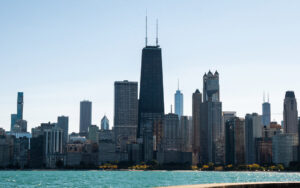By: Daniel S., Seventh Grade, Krieger Schechter Day School of Chizuk Amuno Congregation
The War of Independence. The Six-Day War. The Yom Kippur War. These three wars were all fought by one small country defending its existence. But this country is not a superpower, like Russia, the United States, Great Britain, or France. Israel is a tiny country forced to defend itself time and time again. Located in the Middle East, this country, not even the size of New Jersey, has had to fight for every scrap of its land.
Israel is a country constantly threatened by its Arab neighbors: Syria, Egypt, Saudi Arabia, Lebanon, and Jordan. Yet one of Israel’s main enemies comes from the inside. This territory claiming land in Israel is known as Palestine, and these two opponents are not the best of friends. Their conflict continually escalates with aggression and violence being commonplace. Although Palestine was formed as a recognized country in 1916 by the Allies, the term has been around since the Bronze Age. The country had a short life, as it was dissolved in 1948. However, Palestinians still believe that they are the rightful masters of Israel. Fighting is ongoing because neither side wants to give up land.
Nearly 140 countries recognize the existence of Palestine, the 33rd smallest country in the world, with 2,402 miles2 of land. Just under two-thirds of NATO states do not recognize Palestine, while half of the European Union doesn’t recognize Palestine either. The support for Palestine is strongly held in Africa, Asia, and with South America, with only nine anti-Palestinian countries in those regions: French Guyana, Cameroon, Eritrea, Israel, Myanmar, South Korea, Japan, Singapore, and Armenia. Most support for Palestine comes from Communist or Communist-influenced regions, such as the former Eastern Bloc, the “Stans” (some examples include Kyrgyzstan, Kazakhstan, Pakistan, and Uzbekistan), and the neighbors of Vietnam.
Stephen Gordon, social studies teacher at Krieger Schechter Day School says, “I think that the recognition of Palestine [by the United Nations] is very upsetting. First of all, there really was no nation officially known as Palestine. But the issue really isn’t recognition of Palestine. The issue is about the people who have been living there.”
Palestine as an independent country is not the issue. The problem is the autonomous citizens in Israel who identify as Palestinians and who reject Israel’s existence. Gordon continues, “I think that people want to live side-by-side in peace, and the question is how do you go about that?”
In our modern world, the United Nations determines a country’s status. As Gordon says, “the United Nations is basically run by this very large block of Arab states, and there’s a very strong input from Russia so, the UN has never really been a pro-Israel body.
Nikki Haley, former United States representative to the UN, put forward her point of view about Israel being bullied and other countries bullying their way through the system. She said, ‘The UN is very frustrating because I don’t think it’s a very fair body.’” Although Israel is criticized for its human rights violations, other countries, such as Saudi Arabia and Syria, are completely overlooked for their violations of basic human rights.
Hasia Cohen, Hebrew teacher at KSDS, has a slightly different opinion. She feels that “the Palestinians need to have an economy of their own and they need to be responsible for their life there. The question is whether they will be able to do it without continuing to be dependent on other countries for work or jobs or for infrastructure. If they can be an independent country, they should have an independent country.” Palestine is almost completely dependent on other countries.
According to Oec.world, a website that tracks countries’ imports/exports, Palestine imports millions of dollars-worth of food, goods, machines, and weapons from countries such as Jordan, Egypt, and Turkey. Palestine exports $94.8 million and imports $935 million worth of goods, according to the site, giving Palestine a negative trade balance of $840 million, meaning that Palestine imports $840 million more than it exports. Palestine has the world’s 72nd worst economy with a GDP of $4,890/capita. Palestine receives an incredible amount of foreign aid, but it almost never goes where it is needed most.
“When you ask the people in the streets of Gaza what they want, many of them say that they are dreaming of the time when Israel was in charge of Gaza, because their life was much better,” Cohen says.
Gaza is one of the three planned divisions of Palestine along with the West Bank and East Jerusalem. Although all three divisions are wanted, the Gaza Strip is the only one completely controlled by Palestine. East Jerusalem is under Israeli control and the West Bank is splintered, with some towns under Israeli control and some, like Bethlehem, under Palestinian control. When Israel was in control of the Gaza Strip, people were richer, healthier, and safer than they are now, but the Gaza Strip has been autonomous for 71 years, with most of it under the control of Hamas, a terrorist organization. Hamas uses the foreign aid to fund weapons programs and better their own lives.
On the other hand, Gilad G., seventh grade student at KSDS, says that “[the Palestinians] can try to claim territory in other countries, but in Israel, they should ask for the territory because if they just claim it, Israel is going to have to take it back to keep the peace.”
Ninety-nine percent of Palestinians living in the Gaza Strip are Muslim, and most of them practice Sunni Islam, a branch located mostly in North Africa, the Arabian Peninsula, and the Asian region of the former USSR. Clearly, Palestinians have many countries in which to live, but they choose Israel instead of countries such as Saudi Arabia, Algeria, Yemen, or even neighboring Jordan.
Palestinians have always been native to Israel. Then again, so have Jews. Palestinians were first recorded in the Bible as the Philistines, mentioned in the stories of Samson, Saul, David, and Deborah. During the first century CE, the Romans split Israel into four territories: Idumea, Judea, Samaria, and Palaestina. These were later absorbed into the Ottoman Empire, then split into Palestine, Trans-Jordan, and Greater Lebanon during the Sykes-Picot agreement in 1917. Then, in 1948, the British Mandate ended, and Israel declared its independence. Throughout all 3,500 years of Jewish struggle, the Palestinians have always been present, and they feel a strong connection to their land. They are also being urged to take back the land they feel has been stolen from them.
As in most politics, political cartoons often illustrate issues in this part of the world. However, a good many of these cartoons are Arab-drawn and biased against Israel. Gilad says in relation to the political cartoon below, “I personally believe that there are some aspects of the cartoon that accurately represent what is happening in Palestine and Israel, but I believe there are other parts that are incorrect, such as Israel holding a gun to the Palestinian character’s head, as if it is a warning to say, ‘Don’t you dare try.’ However, that is not what Israel would do.” Israel is only violent when necessary, but, unlike aggressors such as Syria or Iraq, Israel never strikes first.
Some people have nosy neighbors, unwelcome guests, or family issues. Israel is fighting all three at once. People criticize Israel’s reactions without looking at the broader picture. Palestine is Israel’s unwelcome guest, staying for too long and taking too many resources. Also, with recent power struggles around the world, Israel is impacted from Brexit to the 2020 election. Israel has it rough, and Palestine is a leech on Israel’s capabilities. Remember, a checkmate is never quick and easy. Most often, political chess leads to a draw.





